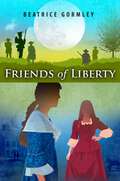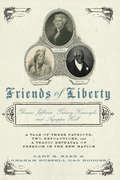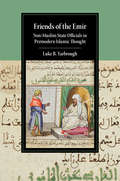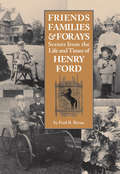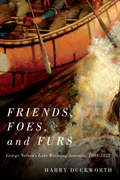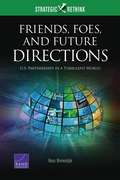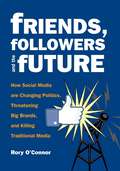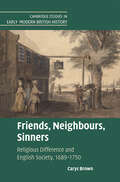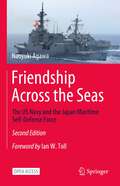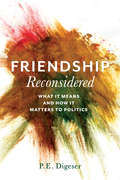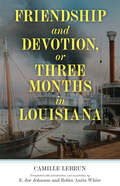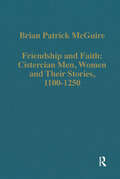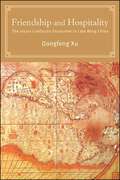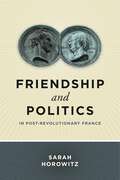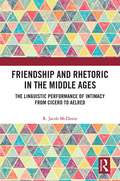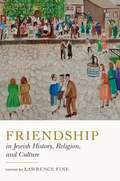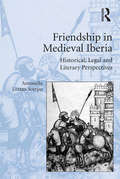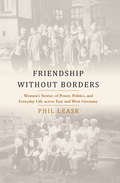- Table View
- List View
Friends of Liberty
by Beatrice GormleyIt's 1773, and Boston is in political turmoil. As tension rises between England and the colonies, lines are being drawn between the Loyalists and the Patriots. And Sally Gifford, a shoemaker's daughter, finds herself on the opposite side from her best friend Kitty Lawton, the daughter of a wealthy merchant.Sally is torn between her cherished friendship and her loyalties to her own family and community in their fight for freedom. As the conflict continues to grow more charged in the weeks leading up to the Boston Tea Party, Sally finds within herself a bravery she didn't know she had, and ultimately takes a stand for what she comes to find is most important.
Friends of Liberty: A Tale of Three Patriots, Two Revolutions, and a Tragic Betrayal of Freedom in the New Nation
by Gary B. Nash Graham Russell Gao HodgesFriends of Liberty tells the remarkable story of three men whose lives were braided together by issues of liberty and race that fueled revolutions across two continents. Thomas Jefferson wrote the founding documents of the United States. Thaddeus Kosciuszko was a hero of the American Revolution and later led a spectacular but failed uprising in Poland, his homeland. Agrippa Hull, a freeborn black New Englander, volunteered at eighteen to join the Continental Army. During the Revolution, Hull served Kosciuszko as an orderly, and the two became fast friends. Kosciuszko’s abhorrence of bondage shaped histhinking about the oppression in his own land. When Kosciuszko returned to America in the 1790s, bearing the wounds of his own failed revolution, he and Jefferson forged an intense friendship based on their shared dreams for the global expansion of human freedom. They sealed their bond with a blood compact whereby Jefferson would liberate his slaves upon Kosciuszko’s death. But Jefferson died without fulfilling the promise he had made to Kosciuszko-and to a fledgling nation founded on the principle of liberty and justice for all.
Friends of the Emir: Non-Muslim State Officials in Premodern Islamic Thought (Cambridge Studies in Islamic Civilization)
by Luke B. YarbroughThe caliphs and sultans who once ruled the Muslim world were often assisted by powerful Jewish, Christian, Zoroastrian and other non-Muslim state officials, whose employment occasioned energetic discussions among Muslim scholars and rulers. This book reveals those discussions for the first time in all their diversity, drawing on unexplored medieval sources in the realms of law, history, poetry, entertaining literature, administration, and polemic. It follows the discourse on non-Muslim officials from its beginnings in the Umayyad empire (661–750), through medieval Iraq, Egypt, Syria, and Spain, to its apex in the Mamluk period (1250–1517). Far from being an intrinsic part of Islam, views about non-Muslim state officials were devised, transmitted, and elaborated at moments of intense competition between Muslim and non-Muslim learned elites. At other times, Muslim rulers employed non-Muslims without eliciting opposition. The particular shape of the Islamic discourse is comparable to analogous discourses in medieval Europe and China.
Friends, Families & Forays: Scenes from the Life and Times of Henry Ford
by Ford R. BryanAn illustrated collection of essays about the various people, events, and experiments from Henry Ford's lifetime.
Friends, Foes, and Furs: George Nelson's Lake Winnipeg Journals, 1804–1822 (Rupert's Land Record Society Series #15)
by Harry W. DuckworthGeorge Nelson (1786–1859) was a clerk for the North West Company whose unusually detailed and personal writings provide a compelling portrait of the people engaged in the golden age of the Canadian fur trade. Friends, Foes, and Furs is a critical edition of Nelson's daily journals, supplemented with exciting anecdotes from his "Reminiscences," which were written after his retirement to Lower Canada. An introduction and annotations by Harry Duckworth place Nelson's material securely within the established body of fur trade history. This series of journals gives readers a first-person account of Nelson's life and career, from his arrival at the age of eighteen in Lake Winnipeg, where he was stationed as an apprentice clerk from 1804 to 1813, to his second service from 1818 to 1819 and an 1822 canoe journey through the region. A keen and respectful observer, Nelson recorded in his daily journals not only the minutiae of his work, but also details about the lives of voyageurs, the Ojibwe and Swampy Cree communities, and others involved in the fur trade. His insights uncover an extraordinary view of the Lake Winnipeg region in the period just prior to European settlement. Making the full extent of George Nelson's journals available for the first time, Friends, Foes, and Furs is an intriguing account of one man's adventures in the fur trade in prairie Canada.
Friends, Foes, and Furs: George Nelson's Lake Winnipeg Journals, 1804–1822 (Rupert's Land Record Society Series #15)
by Harry W. DuckworthGeorge Nelson (1786-1859) was a clerk for the North West Company whose unusually detailed and personal writings provide a compelling portrait of the people engaged in the golden age of the Canadian fur trade. Friends, Foes, and Furs is a critical edition of Nelson's daily journals, supplemented with exciting anecdotes from his "Reminiscences," which were written after his retirement to Lower Canada. An introduction and annotations by Harry Duckworth place Nelson's material securely within the established body of fur trade history. This series of journals gives readers a first-person account of Nelson's life and career, from his arrival at the age of eighteen in Lake Winnipeg, where he was stationed as an apprentice clerk from 1804 to 1813, to his second service from 1818 to 1819 and an 1822 canoe journey through the region. A keen and respectful observer, Nelson recorded in his daily journals not only the minutiae of his work, but also details about the lives of voyageurs, the Ojibwe and Swampy Cree communities, and others involved in the fur trade. His insights uncover an extraordinary view of the Lake Winnipeg region in the period just prior to European settlement. Making the full extent of George Nelson's journals available for the first time, Friends, Foes, and Furs is an intriguing account of one man's adventures in the fur trade in prairie Canada.
Friends, Foes, and Future Directions
by Hans BinnendijkReport evaluates strategies for dealing with U.S. partners and adversaries in Europe, Asia, and the Middle East in a time of diminishing defense budgets and American public preference for a domestic focus. The three proposed strategies are to be more assertive, to be more collaborative, or to retrench from international commitments. Each strategy is constrained and a balance will need to be struck among them that varies from region to region.
Friends, Followers and the Future
by Rory O'Connor"Rory O'Connor is one of the smartest media guys around. He knows who's spinning, who's pandering, and who's putting money in his own pocket at the expense of logic, reason, and the public good."-Michael Wolff, Vanity Fair media criticThere's a revolution going on, as ever-accelerating developments in digital information technologies change nearly every aspect of how we live, work, play, do business, and engage in politics. Share and share alike-the numbers say it all as billions of people worldwide flock to online media and use social networks to discover and spread news and information.In the process, ever-growing networks of "ordinary people" are using these powerful new tools to trim the influence long held by Big Business, Big Government, and Big Media. No longer just passive recipients, participants in social networks now regularly make and break news while organizing civic and political actions that bypass censors, outpace traditional media, attract massive audiences, and influence the rise and fall of brands, industries, politicians, and even governments.In this insider's look at how social media are transforming our world, Rory O'Connor explains the trends and explores what tech visionaries, media makers, political advisers, and businesspeople are saying about the meteoric rise of the various social networks of friends and followers, and what they bode for our future.Rory O'Connor, co-founder of MediaChannel.org, is the author of Shock Jocks: Hate Speech & Talk Radio. He has won two Emmys and a George Orwell Award, among many other honors.
Friends, Lovers, Chocolate (Isabel Dalhousie Novels #2)
by Alexander McCall SmithIsabel Dalhousie thinks often of friends, sometimes of lovers, and on occasion of chocolate. As an Edinburgh philosopher she is certain of where she stands. She can review a book called In Praise of Sin with panache and conviction, but real life is . . . well, perhaps a bit more challenging - particularly when it comes to her feelings for Jamie, a younger man who should have married her niece, Cat. Jamie's handsomeness leaves Isabel feeling distinctly uneasy, and ethically disturbed. 'I am a philosopher', she thinks, 'but I am also a woman'. And more disturbance is in store. When Cat takes a break in Italy, Isabel agrees to run her delicatessen. One of the customers, she discovers, has recently had a heart transplant and is now being plagued by memories that cannot be rationally explained and which he feels do not belong to him. Isabel is intrigued. So intrigued that she finds herself rushing headlong into a dangerous investigation. But she still has time to think about the things that possess her - things like love and friendship, and, of course, temptation. The last of these comes in many forms - chocolate, for example, or seductive Italians . . .
Friends, Lovers, Chocolate (Isabel Dalhousie Novels #2)
by Alexander McCall SmithIn this second novel in the Sunday Philosophy Club, Isabel Dalhousie's niece, Cat (she of the unsuitable boyfriends) is invited to a wedding in Italy. This means that Isabel is left in charge of Cat's delicatessen - a task to which the redoutable moral philosopher proves more than equal. She is intrigued by the customers, of course, given her irrepressible tendency to take an interest in the business of others, and one man in particular attracts her attention. He is recovering from heart surgery - a heart transplant in fact - and when Isabel gets to know him a bit better he reveals an extraordinary aspect of being the recipient of another's heart. Isabel is drawn into an investigation of the facts behind the transplant, with disturbing results. Her enquiries take time, but not so much time as to prevent romantic entanglements, both for Isabel and her housekeeper, Grace. And as for chocolate - that proves to have some very interesting philosophical ramifications - at least in the mind of Isabel Dalhousie. Chocolate is a moral problem, it transpires - invoking questions of temptation and, of course, human weakness. We are all weak when it comes to chocolate, Isabel decides - should we just accept the fact and get on with it?
Friends, Neighbours, Sinners: Religious Difference and English Society, 1689–1750 (Cambridge Studies in Early Modern British History)
by Carys BrownFriends, Neighbours, Sinners demonstrates the fundamental ways in which religious difference shaped English society in the first half of the eighteenth century. By examining the social subtleties of interactions between people of differing beliefs, and how they were mediated through languages and behaviours common to the long eighteenth century, Carys Brown examines the graduated layers of religious exclusivity that influenced everyday existence. By doing so, the book points towards a new approach to the social and cultural history of the eighteenth century, one that acknowledges the integral role of the dynamics of religious difference in key aspects of eighteenth-century life. This book therefore proposes not just to add to current understanding of religious coexistence in this period, but to shift our ways of thinking about the construction of social discourses, parish politics, and cultural spaces in eighteenth-century England.
Friendship Across the Seas: The US Navy and the Japan Maritime Self-Defense Force
by Naoyuki AgawaThis Open Access book describes the history of the relationship between the Japan Maritime Self-Defense Force (JMSDF), the heir to the Imperial Japanese Navy (IJN), and the United States Navy (US Navy), with a focus on the individuals who helped build it. Former enemies who fought fiercely on the seas and in the air during the Pacific War, the two navies came to respect each other in action. Soon after the war, when the Cold War turned hot, they began to work together as allies, driven by their respective national interests. With the generous assistance of the US Navy, the JMSDF was established as its counterpart. Over the years, these two navies have gradually built strong ties. Individual officers and sailors on both sides overcame mixed feelings about their erstwhile foes to feel respect for and trust in each other. This was made possible by conducting countless joint exercises and operations at sea. US Navy leaders began to realize that this small maritime force, notwithstanding domestic political, constitutional, and legal limitations, does its job well, is reliable, and can be fully trusted. The JMSDF realized that, sharing common interests and values, there was no better navy in the Asia-Pacific region to ally with. Over seventy years of accumulated shared experiences have transformed this into perhaps the most successful navy-to-navy partnership in the world. The US-Japan maritime alliance today is anchored in this history. Numerous admirals, officers, and sailors of the two navies working together have greatly contributed to the stability and prosperity of the Asia-Pacific region for the past seven decades. This book is intended for readers interested in the history of US-Japan relations and for naval officers and sailors from the US and other countries. It is the author’s sincere desire that they read this book and appreciate the longstanding cooperation between the JMSDF and the US Navy.
Friendship Reconsidered: What It Means and How It Matters to Politics
by P. DigeserIn the history of Western thought, friendship's relationship to politics is checkered. Friendship was seen as key to understanding political life in the ancient world, but it was then ignored for centuries. Today, friendship has again become a desirable framework for political interaction. In Friendship Reconsidered, P. E. Digeser contends that our rich and varied practices of friendship multiply and moderate connections to politics. Along the way, she sets forth a series of ideals that appreciates friendship's many forms and its dynamic relationship to individuality, citizenship, political and legal institutions, and international relations. Digeser argues that, as a set of practices bearing a family resemblance to one another, friendship calls our attention to the importance of norms of friendly action and the mutual recognition of motive. Focusing on these attributes clarifies the place of self-interest and duty in friendship and points to its compatibility with the pursuit of individuality. She shows how friendship can provide islands of stability in a sea of citizen-strangers and, in a delegitimized political environment, a bridge between differences. She also explores how political and legal institutions can both undermine and promote friendship. Digeser then looks to the positive potential of international friendships, in which states mutually strive to protect the just character of one another's institutions and policies. Friendship's repertoire of motives and manifestations complicates its relationship to politics, Digeser concludes, but it can help us realize the limits and possibilities for generating new opportunities for cooperation.
Friendship and Devotion, or Three Months in Louisiana (Banner Books)
by Camille LebrunParisian Pauline Guyot (1805–1886), who wrote under the nom de plume Camille Lebrun, published many novels, translations, collections of tales, and articles in French magazines of her day. Yet she has largely been forgotten by contemporary literary critics and readers. Among her works is a hitherto-untranslated 1845 French novel, Amitié et dévouement, ou Trois mois à la Louisiane, or Friendship and Devotion, or Three Months in Louisiana, a moralizing, educational travelogue meant for a young adult readership of the time. Lebrun’s novel is one of the few perspectives we have by a mid-nineteenth-century French woman writer on the matters of slavery, abolition, race relations, and white supremacy in France’s former Louisiana colony. E. Joe Johnson and Robin Anita White have recovered this work, providing a translation, an accessible introduction, extensive endnote annotations, and period illustrations. After a short preface meant to educate young readers about the geography, culture, and history of the southern reaches of the Louisiana Purchase, the novel tells the tale of two teenaged, orphaned Americans, Hortense Melvil and Valentine Arnold. The two young women, who characterize one another as “sisters,” have spent the majority of their lives in a Parisian boarding school and return to Louisiana to begin their adult lives. Almost immediately upon arrival in New Orleans, their close friendship faces existential threats: grave illness in the form of yellow fever, the prospect of marriage separating the two, and powerful discrimination in the form of racial prejudice and segregation.
Friendship and Empire
by Paul J. BurtonIn this bold new interpretation of the origins of ancient Rome's overseas empire, Dr Burton charts the impact of the psychology, language and gestures associated with the Roman concept of amicitia, or 'friendship'. The book challenges the prevailing orthodox Cold War-era realist interpretation of Roman imperialism and argues that language and ideals contributed just as much to Roman empire-building as military muscle. Using a constructivist theoretical framework drawn from international relations, Dr Burton replaces the modern scholarly fiction of a Roman empire built on networks of foreign clients and client-states with an interpretation grounded firmly in the discursive habits of the ancient texts themselves. The results better account for the peculiar rhythms of Rome's earliest period of overseas expansion - brief periods of vigorous military and diplomatic activity, such as the rolling back of Seleucid power in Asia Minor and Greece in 192-188 BC, followed by long periods of inactivity.
Friendship and Faith: Cistercian Men, Women, and Their Stories, 1100-1250 (Variorum Collected Studies)
by Brian Patrick McGuireIn these articles Professor McGuire explores the riches of the Cistercian exemplum tradition. These texts are made up of brief stories, often with a miraculous content, which provided moral support for novices and monks in Cistercian abbeys all over Europe in the High Middle Ages. The Cistercians have been seen mainly in terms of their great writers like Bernard of Clairvaux and the impressive buildings they left behind. But Cistercian literature also provides us with more humble insights from daily life, shedding light on questions of sexuality, anger, depression, and bonds of friendship, also between monks and nuns. They bring a freshness of insight and immediate experience, and their seeming naivety lets us be aware of monks' commitment to each other in individual and community bonds. In Cistercian storytelling, the Gospel's message meets an historical context and bears witness to a transformation of Christian life and idealism, while at the same time allowing us precious insights into how ordinary men and women, not just monks and nuns, lived and thought.
Friendship and Hospitality: The Jesuit-Confucian Encounter in Late Ming China (SUNY series in Chinese Philosophy and Culture)
by Dongfeng XuThe Jesuit mission to China more than four hundred years ago has been the subject of sustained scholarly investigation for centuries. Focusing on the concepts of friendship and hospitality as they were both theorized and practiced by the Jesuit missionaries and their Confucian hosts, this book offers a new, comparative, and deconstructive reading of the interaction between these two vastly different cultures. Dongfeng Xu analyzes how the Jesuits presented their concept of friendship to achieve their evangelical goals and how the Confucians reacted in turn by either displaying or denying hospitality. Challenging the hierarchical view in traditional discourse on friendship and hospitality by revealing the irreducible otherness as the condition of possibility of the two concepts, Xu argues that one legacy of the Jesuit-Confucian encounter has been the shared recognition that cultural differences are what both motivated and conditioned cross-cultural exchanges and understandings.
Friendship and Politics in Post-Revolutionary France
by Sarah HorowitzIn Friendship and Politics in Post-Revolutionary France, Sarah Horowitz brings together the political and cultural history of post-revolutionary France to illuminate how French society responded to and recovered from the upheaval of the French Revolution. The Revolution led to a heightened sense of distrust and divided the nation along ideological lines. In the wake of the Terror, many began to express concerns about the atomization of French society. Friendship, though, was regarded as one bond that could restore trust and cohesion. Friends relied on each other to serve as confidants; men and women described friendship as a site of both pleasure and connection. Because trust and cohesion were necessary to the functioning of post-revolutionary parliamentary life, politicians turned to friends and ideas about friendship to create this solidarity. Relying on detailed analyses of politicians’ social networks, new tools arising from the digital humanities, and examinations of behind-the-scenes political transactions, Horowitz makes clear the connection between politics and emotions in the early nineteenth century, and she reevaluates the role of women in political life by showing the ways in which the personal was the political in the post-revolutionary era.
Friendship and Politics in Post-Revolutionary France
by Sarah HorowitzIn Friendship and Politics in Post-Revolutionary France, Sarah Horowitz brings together the political and cultural history of post-revolutionary France to illuminate how French society responded to and recovered from the upheaval of the French Revolution. The Revolution led to a heightened sense of distrust and divided the nation along ideological lines. In the wake of the Terror, many began to express concerns about the atomization of French society. Friendship, though, was regarded as one bond that could restore trust and cohesion. Friends relied on each other to serve as confidants; men and women described friendship as a site of both pleasure and connection. Because trust and cohesion were necessary to the functioning of post-revolutionary parliamentary life, politicians turned to friends and ideas about friendship to create this solidarity. Relying on detailed analyses of politicians’ social networks, new tools arising from the digital humanities, and examinations of behind-the-scenes political transactions, Horowitz makes clear the connection between politics and emotions in the early nineteenth century, and she reevaluates the role of women in political life by showing the ways in which the personal was the political in the post-revolutionary era.
Friendship and Rhetoric in the Middle Ages: The Linguistic Performance of Intimacy from Cicero to Aelred
by R. Jacob McDonieFriendship and Rhetoric in the Middle Ages: The Linguistic Performance of Intimacy from Cicero to Aelred covers approximately 1,200 years of literature. This is a book on "medieval literature" that foregrounds language as the agent for cultivating medieval friendship (from the first century BC to c. 1160 AD) in oratorical, ecclesiastical, monastic, and erotic contexts. Taking a different approach than many works in this area, which search for the lived experience of friends behind language, this book stands apart in looking at friendship's enactment through rhetorical language among classical and medieval authors.
Friendship in Jewish History, Religion, and Culture (Dimyonot #12)
by Lawrence FineThe ubiquity of friendship in human culture contributes to the fallacy that ideas about friendship have not changed and remained consistent throughout history. It is only when we begin to inquire into the nature and significance of the concept in specific contexts that we discover how complex it truly is. Covering the vast expanse of Jewish tradition, from ancient Israel to the twenty-first century, this collection of essays traces the history of the beliefs, rituals, and social practices surrounding friendship in Jewish life.Employing diverse methodological approaches, this volume explores the particulars of the many varied forms that friendship has taken in the different regions where Jews have lived, including the ancient Near East, the Greco-Roman world, Europe, and the United Sates. The four sections—friendship between men, friendship between women, challenges to friendship, and friendships that cross boundaries, especially between Jews and Christians, or men and women—represent and exemplify universal themes and questions about human interrelationships. This pathbreaking and timely study will inspire further research and provide the groundwork for future explorations of the topic.In addition to the editor, the contributors are Martha Ackelsberg, Michela Andreatta, Joseph Davis, Glenn Dynner, Eitan P. Fishbane, Susannah Heschel, Daniel Jütte, Eyal Levinson, Saul M. Olyan, George Savran, and Hava Tirosh-Samuelson.
Friendship in Jewish History, Religion, and Culture (Dimyonot: Jews and the Cultural Imagination #12)
by Lawrence FineThe ubiquity of friendship in human culture contributes to the fallacy that ideas about friendship have not changed and remained consistent throughout history. It is only when we begin to inquire into the nature and significance of the concept in specific contexts that we discover how complex it truly is. Covering the vast expanse of Jewish tradition, from ancient Israel to the twenty-first century, this collection of essays traces the history of the beliefs, rituals, and social practices surrounding friendship in Jewish life.Employing diverse methodological approaches, this volume explores the particulars of the many varied forms that friendship has taken in the different regions where Jews have lived, including the ancient Near East, the Greco-Roman world, Europe, and the United Sates. The four sections—friendship between men, friendship between women, challenges to friendship, and friendships that cross boundaries, especially between Jews and Christians, or men and women—represent and exemplify universal themes and questions about human interrelationships. This pathbreaking and timely study will inspire further research and provide the groundwork for future explorations of the topic.In addition to the editor, the contributors are Martha Ackelsberg, Michela Andreatta, Joseph Davis, Glenn Dynner, Eitan P. Fishbane, Susannah Heschel, Daniel Jütte, Eyal Levinson, Saul M. Olyan, George Savran, and Hava Tirosh-Samuelson.
Friendship in Medieval Iberia: Historical, Legal and Literary Perspectives
by Antonella Liuzzo ScorpoPrivate and public relationships - frequently labelled as friendships - have always played a crucial role in human societies. Yet, over the centuries ideas and meanings of friendship transformed, adapting to the political and social climates of different periods. Changing concepts and practices of friendship characterized the intellectual, social, political and cultural panorama of medieval Europe, including that of thiteenth-century Iberia. Subject of conquests and 'Reconquest', land of convivencia, but also of political instability, as well as of secular and religious international power-struggles: the articulation of friendship within its borders is a particularly fraught subject to study. Drawing on some of the encyclopaedic vernacular masterpieces produced in the scriptorium of 'The Wise' King, Alfonso X of Castile (1252-84), this study explores the political, religious and social networks, inter-faith and gender relationships, legal definitions, as well as bonds of tutorship and companionship, which were frequently defined through the vocabulary and rhetoric of friendship. This study demonstares how the values and meanings of amicitia, often associated with classical, Roman, Visigothic and Eastern traditions, were transformed to adapt to Alfonso X’s cultural projects and political propaganda. This book contributes to the study of the history of emotions and cultural histories of the Middle Ages, while also emphasizing how Iberia was a peripheral, but still vital, ring in a chiain which linked it to the rest of Europe, while also occupying a central role in the historical and cultural developments of the Western Mediterranean.
Friendship without Borders: Women's Stories of Power, Politics, and Everyday Life across East and West Germany
by Phil LeaskAcross half a century, from the division of Germany through the end of the Cold War, a cohort of thirty women from the small German town of Schönebeck in what used to be the GDR circulated among themselves a remarkable collective archive of their lives: a Rundbrief, or bulletin, containing hundreds of letters and photographs. This book draws on that unprecedented resource, complemented by a set of interviews, to paint a rich portrait of “ordinary” life in postwar Germany. It shows how these women—whether reflecting on their experiences as Nazi-era schoolchildren or witnessing reunification—were united by their complex interactions with official power and their commitment to sustaining a shared German identity as they made the most of their everyday lives in both the GDR and the Federal Republic.
Friendship without Borders: Women's Stories of Power, Politics, and Everyday Life across East and West Germany
by Phil LeaskAcross half a century, from the division of Germany through the end of the Cold War, a cohort of thirty women from the small German town of Schönebeck in what used to be the GDR circulated among themselves a remarkable collective archive of their lives: a Rundbrief, or bulletin, containing hundreds of letters and photographs. This book draws on that unprecedented resource, complemented by a set of interviews, to paint a rich portrait of “ordinary” life in postwar Germany. It shows how these women—whether reflecting on their experiences as Nazi-era schoolchildren or witnessing reunification—were united by their complex interactions with official power and their commitment to sustaining a shared German identity as they made the most of their everyday lives in both the GDR and the Federal Republic.
